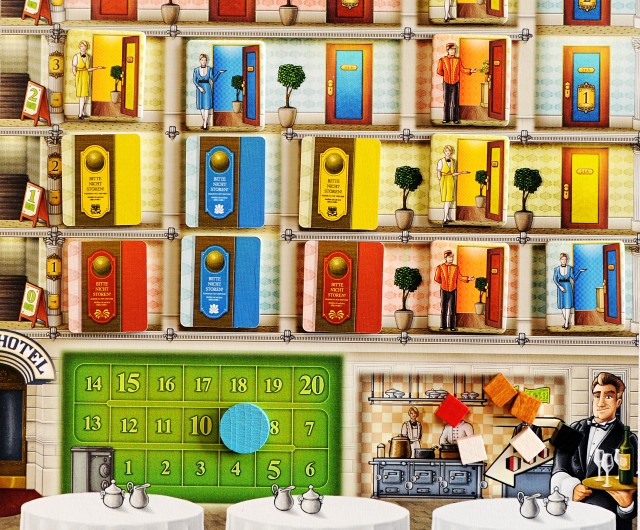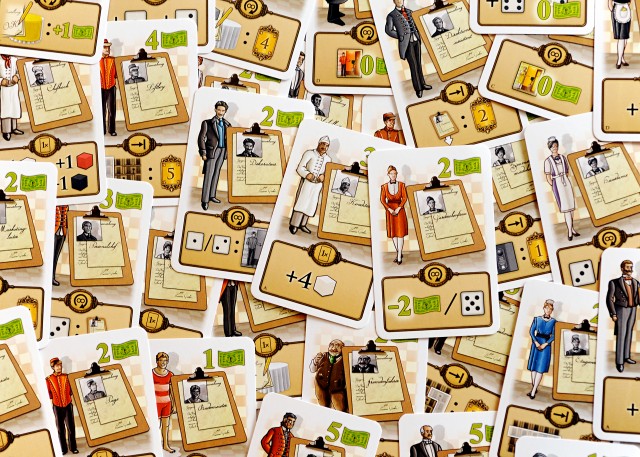Nowadays, if you want to stay at a hotel, it’s a rather pedestrian affair. You make a reservation, show up, take all the free soap, leave towels strewn on the floor, pay, and leave. Hotel managers ensure their customers are happy enough to return, while still maximizing profits. But Grand Austria Hotel harkens back to a time when the business of being a hotelier was refined and artful. The men donned doublets, the women wore frocks, and artists were somehow able to afford both room and board. It was no surprise when the Emperor would come to visit. After all, no one appreciates quality lodging quite like the sovereign ruler of the Empire.
Grand Austria Hotel puts you in the shoes of the once flaunted hotelier, asking you to attract desirable guests, feeding them their choice of strudel, cake, wine, or coffee, and finding a room that suits their disposition. Mechanically, it’s a sort of set collection game, driven by action selection and shared objectives. You can acquire staff with various strengths to help your operation run more smoothly, and the guests themselves will often lend a helping hand once they’re fed.
How it works
Each player has a hotel board, which features the hotel itself, the cafe, your money track (krones, to be precise), the kitchen, and tables for three guests. On the main board, you’ll find the shared goals (Politics cards), the turn order and Emperor tracks, the Emperor’s  rewards/punishments, and a queue of guests waiting to be seated. Finally, the action board offers the six main actions available during the game, whose efficiency will be determined by the dice you roll each round. Take 10 krones, 6 staff cards, one of each of the 4 food types, prepare 3 rooms, and you’re ready to begin.
rewards/punishments, and a queue of guests waiting to be seated. Finally, the action board offers the six main actions available during the game, whose efficiency will be determined by the dice you roll each round. Take 10 krones, 6 staff cards, one of each of the 4 food types, prepare 3 rooms, and you’re ready to begin.
In each of the seven rounds, the start player rolls 10/12/14 dice (2/3/4 players) and sorts them by value on the action board. Clockwise from the start player, each player chooses whether or not to seat a new guest (paying krone to choose one further up the queue), then takes a die to perform the corresponding action, thus weakening the action for other players. The start player has the advantage of choosing first, but the disadvantage of choosing last – once each player has taken a die, the turn order reverses (like setup in Catan). After all players have performed two actions, the round ends and the start player passes clockwise.
The six sides of each die correspond to one of the six actions on the action board.
To perform an action, you take a die and perform the corresponding action. Here’s the trick: the power of each action corresponds to the number of dice associated with that action. The more twos there are, the more powerful action two will be. Let’s say you chose an action with 3 dice, what would that look like?
As I mentioned above, you can welcome one guest to your restaurant at the beginning of each turn, but only if there’s room. In addition, there are several free actions you can perform each turn, either immediately before or after your main action. They include spending a krone to increase the power of your main action, bussing  food and drink to your restaurant guests, and showing satisfied guests to their rooms, thus flipping the room’s token over for the rest of the game (your guests love your rooms so much that they never leave. Huh? Sweeney Todd who?). Guests, once fed and sent to their room, tip you kindly, rewarding you with a mixture of victory points and valuable bonuses.
food and drink to your restaurant guests, and showing satisfied guests to their rooms, thus flipping the room’s token over for the rest of the game (your guests love your rooms so much that they never leave. Huh? Sweeney Todd who?). Guests, once fed and sent to their room, tip you kindly, rewarding you with a mixture of victory points and valuable bonuses.
To make your work as hotelier all the more demanding, most guests insist that you to abide by their strict room requirements. Tourists (green) are happy with any room you offer, but nobles (blue), artists (yellow), and citizens (red) will only stay in rooms of their own colour. The rooms themselves are sorted in groups, which offer rewards when completed. Filling a group of blue rooms grants you victory points, where red ones grant kroner, and yellow ones move you along the emperor track. The emperor is a great lover of art, his favourite pieces being busts of his own image.
At the end of rounds 3, 5, and 7, the emperor will check in and award the players victory points based on their progress on their emperor track (the icon for which is a bust of the man himself). For some reason or another, each player then moves backward on the emperor track a number of spaces equal to the round, and the  emperor will either reward or punish the players based on their new positions. Tending to this track feels similar to, say, feeding your family in Agricola. Tempting to ignore, but generally a bad idea to do so.
emperor will either reward or punish the players based on their new positions. Tending to this track feels similar to, say, feeding your family in Agricola. Tempting to ignore, but generally a bad idea to do so.
I like to think that the emperor is a sleepwalking kleptomaniac. He arrives late one evening and awards you victory points based on how many busts of himself he sees. Soon after, he rests his weary head only to prowl the halls of your establishment, robbing you specifically of the very same busts he lauded upon his arrival. When he wakes, if your collection of emperor heads is sufficient, you’ll be kindly rewarded. If not, he brings the hammer down. What’s worse is that, as the game goes on, his affliction seems to worsen, as he pilfers more busts each time he visits. The poor guy. Ruling an empire is really taking a toll on him.
Seven rounds pass, the emperor leaves for the third time, his luggage suspiciously overburdened, and the game is done. The players score points for their occupied rooms, leftover food, drink, and Kroner, as well as staff who offer game end victory points for satisfying various conditions. As you might expect, the player with the most points wins – tales of your legendary skills as a hotelier become the stuff of legend and are used to inspire aspiring hotel managers to this day.
Art and components
Those of your familiar with Uwe Rosenberg’s heavier games (Agricola, Le Havre, Caverna, etc.) will immediately notice Klemens Franz’s style. A slightly goofy, cartoon style, with enough detail to make each person’s face (of which there are many) distinct. It represents the inventive theme very well and gives it life and vibrancy to spare. The remaining components are minimal: coloured cubes represent food and drink, and markers for each player to track their kroner, score, etc. Nothing fancy, but it’s all quality material.
The experience
It never occurred to me that I might enjoy managing a cardboard hotel, but lo’, I certainly do. Simone Luciani (The Voyages of Marco Polo, Tzolk’in) and Virgino Gigli (Egizia, Leonardo DaVinci) skillfully blend action selection, set collection, resource management, and bonuses, with a smidgen of engine building via the staff cards, into a wholly enjoyable 60-90 minutes. The decisions are often difficult, but not overwhelmingly so, and any stress imposed by the emperor’s arrival is tempered by the satisfaction I felt each time I could send a guest to their expertly prepare suite – the bonus each unique guest offers helps to bond the satisfaction of a job well done with a reward well earned. Not only do I look forward to playing it again, but I’ve thought about it every day since I last played it almost a week ago. This is a telltale sign of a well designed game that offers nuanced depth and is just plain fun to play.
One caveat: Grand Austria Hotel takes approximately 30 minutes per player to play. With 2-3 players (60-90 minutes), this is no problem whatsoever. But with 4 players, the downtime is substantial enough that it readily detracts from the overall experience. The balance the game achieves by using a ‘switchback’ turn order becomes a problem when, for instance, the start player must wait for 6 ‘turns’ between his or her first and section action in a round. If you’re looking for an engrossing 4 player game, this isn’t it. Groups of 2 or 3, however, will find lots to love in this suite package.
Grand Austria Hotel is published by Lookout Games; it plays 2 – 4 people, taking 60 – 120 minutes depending.
The downtime at 4 players is a common complaint with this otherwise great game. There’s an official turn order variant from the designer where at 4, the selection proceeds clockwise and the first player to pass becomes the new first player.
Interesting variant! – Nicole
My only complaint is that the tiny cursive typeface on the staff cards that shows their occupation makes it very nearly impossible to decipher it. Really poor design decision in an otherwise really good game.